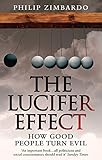The Lucifer effect : understanding how good people turn evil / Philip Zimbardo.
Material type: TextLanguage: English London : Rider Books, 2007©2007 Edition: 2008 Random House trade pbk. edDescription: xx, 551 pages : illustrations ; 21 cmContent type: text Media type: unmediated Carrier type: volumeISBN: 9781846041037 (paperback)Subject(s): Good and evil -- Psychological aspectsLOC classification: BF789.E94 Z56 2007
TextLanguage: English London : Rider Books, 2007©2007 Edition: 2008 Random House trade pbk. edDescription: xx, 551 pages : illustrations ; 21 cmContent type: text Media type: unmediated Carrier type: volumeISBN: 9781846041037 (paperback)Subject(s): Good and evil -- Psychological aspectsLOC classification: BF789.E94 Z56 2007| Item type | Current library | Shelving location | Call number | Copy number | Status | Date due | Barcode |
|---|---|---|---|---|---|---|---|
| Books | MEF Üniversitesi Kütüphanesi | Genel Koleksiyon | BF 789 .E94 Z56 2007 (Browse shelf (Opens below)) | Available | 0010678 | ||
| Books | MEF Üniversitesi Kütüphanesi | Genel Koleksiyon | BF 789 .E94 Z56 2007 (Browse shelf (Opens below)) | c.2 | Available | 0011383 |
Browsing MEF Üniversitesi Kütüphanesi shelves, Shelving location: Genel Koleksiyon Close shelf browser (Hides shelf browser)

|

|

|

|

|

|

|
||
| BF 774 .S4319 2018 Başkalarının aklı : neden bazılarımız ikna etmekte daha başarılı ve nörobilim bu konuda ne düşünüyor? / | BF 789 .D4 D43 1975 Death: the final stage of growth / | BF 789 .E94 Z56 2007 The Lucifer effect : understanding how good people turn evil / | BF 789 .E94 Z56 2007 The Lucifer effect : understanding how good people turn evil / | BF 833 .A3519 2020 İnsanı tanıma sanatı / | BF 833 .A419 2016 İnsan doğasını anlamak / | BF 833 .A419 2017 İnsan tabiatını tanıma / |
The psychology of evil: situated character transformations -- Sunday's surprise arrests -- Let Sunday's degradation rituals begin -- Monday's prisoner rebellion -- Tuesday's double trouble: visitors and rioters -- Wednesday is spiraling out of control -- The power to parole -- Thursday's reality confrontations -- Friday's fade to black -- The SPE's meaning and messages: the alchemy of character transformations -- The SPE: ethics and extensions -- Investigating social dynamics: power, conformity, and obedience -- Investigating social dynamics: deindividuation, dehumanization, and the evil of inaction -- Abu Ghraib's abuses and tortures: understanging and personalizing its horrors -- Putting the system on trial: command complicity -- Resisting situational influences and celebrating heroism.
The definitive firsthand account of the groundbreaking research of Philip Zimbardo-the basis for the award-winning film The Stanford Prison Experiment Renowned social psychologist and creator of the Stanford Prison Experiment Philip Zimbardo explores the mechanisms that make good people do bad things, how moral people can be seduced into acting immorally, and what this says about the line separating good from evil. The Lucifer Effect explains how-and the myriad reasons why-we are all susceptible to the lure of "the dark side." Drawing on examples from history as well as his own trailblazing research, Zimbardo details how situational forces and group dynamics can work in concert to make monsters out of decent men and women. Here, for the first time and in detail, Zimbardo tells the full story of the Stanford Prison Experiment, the landmark study in which a group of college-student volunteers was randomly divided into "guards" and "inmates" and then placed in a mock prison environment. Within a week the study was abandoned, as ordinary college students were transformed into either brutal, sadistic guards or emotionally broken prisoners. By illuminating the psychological causes behind such disturbing metamorphoses, Zimbardo enables us to better understand a variety of harrowing phenomena, from corporate malfeasance to organized genocide to how once upstanding American soldiers came to abuse and torture Iraqi detainees in Abu Ghraib. He replaces the long-held notion of the "bad apple" with that of the "bad barrel"-the idea that the social setting and the system contaminate the individual, rather than the other way around. This is a book that dares to hold a mirror up to mankind, showing us that we might not be who we think we are. While forcing us to reexamine what we are capable of doing when caught up in the crucible of behavioral dynamics, though, Zimbardo also offers hope. We are capable of resisting evil, he argues, and can even teach ourselves to act heroically. Like Hannah Arendt's Eichmann in Jerusalem and Steven Pinker's The Blank Slate, The Lucifer Effect is a shocking, engrossing study that will change the way we view human behavior.
